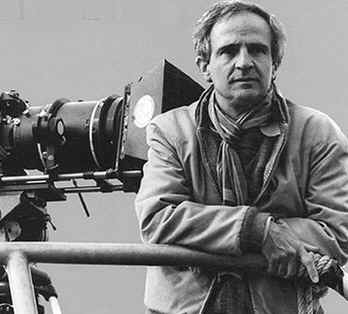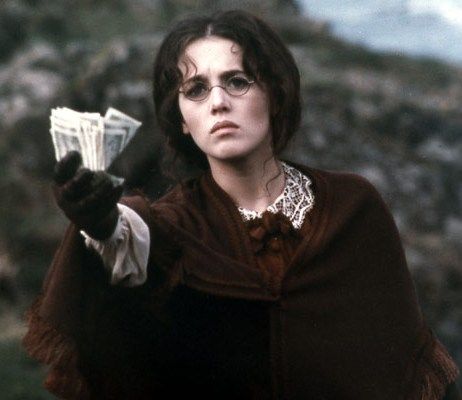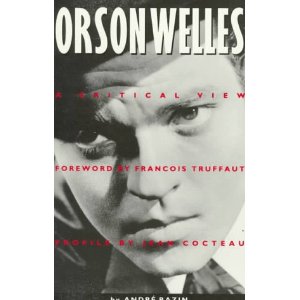The first and last parts of what follows are taken (and in a few cases adapted) from my book Discovering Orson Welles. — J.R.
In spite of my five years of living in Paris, my grasp of French has always been mediocre — a weakness that over the years I’ve come to regard as a sort of disability, because I’ve made many efforts to overcome it. That François Truffaut had a similar (and similarly embarrassing) problem with his English set the stage for a rather awkward and uncomfortable afternoon in London between the two of us — with his assistant Suzanne Schiffmann often serving as mutual interpreter — after I’d signed with Harper & Row to carry out a translation of Bazin’s book on Welles, as well as a new Foreword to that book that Truffaut was writing. Truffaut undoubtedly came away from that afternoon with some understandable skepticism about why I’d been hired to do this job, while I emerged, somewhat defensively, with the impression that he was closer to being a nervous and irritable businessman than the sort of critic and director that I had formerly revered.
I hasten to add that I wasn’t bluffing when I’d praised in print Bazin’s 1950 monograph on Welles in 1971 as the best criticism published about him —- or at least not entirely. (This was a few years before I encountered James Naremore’s The Magic World of Orson Welles, the first edition of which was published in 1978.) Like many other American film buffs of that era, I’d spent long hours reading it and many other French critical texts with what I’d retained from my college French courses and a French-English dictionary. During my years in Paris, I also read such books as Noël Burch’s Praxis du cinéma and Roland Barthes’ Le plaisir du texte and paged through countless issues of Cahiers du Cinéma, Positif, and other magazines and film books in the same manner.
So when I received an offer from Harper & Row to translate Bazin’s Orson Welles —- specifically, the posthumously published book of that title brought out by Editions du Cerf in 1972, which I knew less well than the 1950 Chavane monograph — after I moved from Paris to London, I was faced with a quandary: the job was too appealing to turn down, but I also knew that I could perform it adequately only with enormous effort, as well as help from some of my more bilingual friends in London. I also rationalized that here at last was the sort of challenge that could hopefully force me to master the language once and for all. So with a queasy mixture of optimism and resolve, I gritted my teeth and plunged in.
Ultimately, I used all the possible means at my disposal. After protracted stretches of wrestling alone with the text, I commissioned literal translations of some chapters from the late Jill Forbes —- a fellow film buff in Paris who taught French literature in London —- and spent many hours revising them, then annotating or correcting many of Bazin’s factual errors, which proved to be far more numerous than I’d anticipated. (I also commissioned my Paris friend Gilbert Adair, a passionate Cocteauvian, to translate Jean Cocteau’s charming Preface, and credited him for it.)
Finally, and most importantly, I benefited from the generosity of my flatmate at the time, Tom Milne — a superb translator who had already tackled Godard’s criticism and regularly subtitled French films for the BBC —- who went over my drafts line by line with the original and made many revisions and suggestions.
During the same period, I wound up having a much easier time corresponding with Truffaut, especially once we hit on the logical procedure of writing one another in our respective languages. While he was working on his own excellent Foreword and both soliciting and following most of my editorial suggestions (such as my arguments on behalf of THE LADY FROM SHANGHAI, which he had treated somewhat dismissively in his first draft), he was also furnishing me on a regular basis with other texts of Bazin about Welles and encouraging me to incorporate the most interesting passages from them as footnotes. I was nevertheless a bit put off by a couple of details in his Foreword, which appeared towards the beginning and at the very end. He concluded the essay with the line, “On the plane between Paris and Los Angeles,” which was sheer invention (if memory serves, he was on Guernsey, one of the Channel Islands, at the time, shooting L’HISTOIRE DE ADELE H.) —- not a serious fib, but still slightly perturbing to me at the time. What bothered me more was the sentence concluding his third paragraph: “This little volume, superbly prefaced by Jean Cocteau, quickly went out of print and became a collector’s item, and in 1958, shortly before his death, sparked by enthusiasm for TOUCH OF EVIL, Bazin prepared a revised and expanded edition, published here in Jonathan Rosenbaum’s translation.”
Though I was ridiculously slow to realize this, this sentence was not only a fib —- in this case an unwitting one — but one that revealed that Truffaut hadn’t bothered to read or at least reread the two Bazin volumes in question, because the 1958 book wasn’t at all a “revised and expanded edition” of the 1950 one but a completely different text. It was also a markedly inferior one — written in obvious haste, and in some cases copying out passages from a poorly translated French version of an already not very reliable book in English by Peter Noble. But given my embarrassment about not having spotted this sooner, and my even greater sense of intimidation about confronting Truffaut with this discovery, I kept silent about it.
This led in turn to a growing resentment against Truffaut that eventually found expression in a brief diatribe in a “London and New York Journal” for the July-August 1976 Film Comment, reprinted on pages 26-27 of my collection Placing Movies: The Practice of Film Criticism (California, 1995):
“THE STORY OF ADELE H. , or GIDGET GOES HEGELIAN. Truffaut’s pretty, nonobsessive postcards about obsession are a gift to the eye in Nestor Almendros’s photography, but a dull bromide to the mind. Apart from offering a veritable film festival to the spectator who wants to wallow in self-pity and call it literary, the camera’s habit of cutting away to another quaintly posed setup every time the heroine’s perversity starts to become interesting only underlines how steadily Truffaut has been veering away from any serious risks. A crowd pleaser in the tradition of Chaplin, he has yet to make his MONSIEUR VERDOUX or A KING IN NEW YORK because he always looks for the easy way out.
“Much as his collected movie pieces . . . exclude all his polemical writing, and his editing of Bazin has tended to follow suit — with comparable implications of historical whitewash — this movie takes the tang out of its heroine’s madness by giving us a healthy, talented ingenue in place of an actress. Of course, one can understand Pauline Kael believing this to be a great work of art, just as one can understand many American intellectuals believing that Kael is a great aesthetician. Given the right sort of climate and training, anything’s possible, even the Nixon administration and snuff movies.”
This over-the-top outburst provoked the following exchange of letters with Truffaut. Both of Truffaut’s letters were written in French; the English translation here is Gilbert Adair’s, reproduced from Truffaut’s Letters (Boston/London: Faber and Faber, 1989, 461-464), which is now out of print:
9 Nov. 76
My dear Jonathan,
Thank you for your last letter and your kindness with regard to the book on Othello [Put Money in Thy Purse].
I would be a hypocrite and would feel ill at ease if I did not tell you how sad I was when I read an article of yours in Film Comment two months ago.
You don’t like Adèle H. That is your privilege as a critic, as it is not to admire Isabelle Adjani. Except, why, when I asked nothing of you, did you say such nice things to me about Adèle in a letter written when you returned from New York?
With regard to my book, Les Films de ma vie, it contains several negative pieces: on Albert Lamorisse, Anatole Litvak, Jacques Becker (Arsène Lupin), Mervyn LeRoy and René Clément….Moreover, if I decided against publishing my negative criticisms of Yves Allégret, Jean Delannoy, Marcel Carné, etc., it is because these directors are now old men […] and it would be needlessly cruel of me to hamper their efforts to continue working. It’s a situation you will understand better when you are a little older. That said, I accept your criticism of the book.
The writings of André Bazin: there, I really don’t understand what it is you object to. The choice of texts? That was determined by what the publishers would accept or refuse and by the fact that Bazin himself had made a selection of his best articles for his book, Qu’est-ce que le cinéma?. As I think I already told you in a previous letter, my aim in publishing Bazin’s articles was a twofold one: to acquaint British and American film students with his work and also to help Janine Bazin who found herself in difficulties when French television canceled her series of programmes Cinéastes de notre temps.
If I had written you you two months ago after reading your article, my letter would probably have been violent and unjust. Since then, my anger has subsided, but not a certain sadness, since I continue to feel that there was an incompatibility between the spirit of your article and the friendly tone of your letters. Dr Jonathan and Mr Rosenbaum?
In any event, I remain grateful for the care and attention with which you translated the Bazin-Welles; I hope the publishers conduct themselves in a more satisfactory fashion during the final stage of the project and I wish you the very best of luck,
Truffaut
P.S. I’ve been detained in Montpellier by the shooting of my new film, The Man Who Loved Women, it will therefore be impossible for me to come to the London Film Festival.
***
12 November 1976
Dear François,
I’m very sorry about the distress that my remarks in Film Comment have caused you. They have brought home to me Faulkner’s remark that the critic addresses himself to everyone except the artist. My anger was chiefly directed against a particular critical climate in America, which included the reception of L’Histoire de Adèle H. and Bazin — what I believed to be an essentially unreflecting attitude that overlooked too many things and accepted too much too easily. Frankly, I did not expect that you would read these remarks, and feeling relatively powerless, I did not believe that they would have much effect on anyone: they were a kind of protest against a myth — or what I believe to be a myth — that will surely outlast me.
I’ve just re-read my letter to you of last April 22nd, which ended by saying that I admired many things in L’Histoire de Adèle H. (and was written about a month before I wrote those two paragraphs for Film Comment). I do admire many things about the film, and was not being insincere when I mentioned this in a letter. I admire it enough, in fact, to feel a very strong disappointment that it did not pursue some of its obsessional aspects further — something that I didn’t mention in my letter because I felt it would have been rude in that context for me to say so. Whatever my misgivings about your recent work, the fact that I connect it with Chaplin’s is — for me, at any rate — very high praise indeed. When I saw L’Argent de poche last week, I was struck by this relationship again, above all in the teacher’s speech at the end, which reminded me a great deal of Chaplin’s speech at the end of The Great Dictator — above all, because of its sincerity.
Perhaps the split that you see in my behavior — Dr Jonathan and Mr Rosenbaum — is based on what seems to me a kind of split in your own work. In much the same way, the ‘real’ Bazin for me is the Bazin who wrote the original Chavanne edition of Orson Welles more than the one who revised it by eliminating much of the theory and polemics and largely replacing it with information (much of it incorrect) taken from the French translation of Peter Noble’s Welles book. And my misgivings about your publication of Bazin’s texts — which I support in all other respects — is that it completely avoids problems of this kind, as if they didn’t exist. In spite of your admirable desire for me to incorporate other writings by Bazin on Welles in the book, I feel that the book still represents Bazin’s contribution incompletely, and I regret the absence of any acknowledgment in your introduction that much of what he eliminated in the Chavanne edition remains very important, theoretically as well as historically. In this respect, I felt that you were ‘passing on’ the book but not presenting it in the way that you present Welles’ own work — which I feel that you do very well and effectively. Perhaps I should have written to you about this at the time; shyness prevented me from doing so.
None of this, I should add, has anything to do with the help, encouragement and kindness that you have shown me in relation to the Welles book at every stage, all of which I continue to appreciate. And I can only express my regrets that my instinct as a critic conflicted with our own relationship, for whatever my misgivings about certain aspects of your work, I bear you no ill will. As someone whose own early criticism once led him to be barred from the Cannes Film Festival, I’m sure that you know a great deal more than I do about the perils and consequences of being an aggressive critic, but lately I’ve been discovering quite a few of these on my own.
Sincerely,
Jonathan Rosenbaum
***
Montpellier, 29 November 1976
My dear Jonathan,
Thank you for your letter of 12 November, I was very touched by it. My only regret is that we didn’t write to each other more often about Bazin’s book on Welles. It was André S. Labarthe who put together the French edition, and my sole involvement was finding an American publisher, who accepted the book only on condition that I write a lengthy preface.
Bazin himself had revised the text of the Chavanne edition for a chapter on Welles in a book that was to be edited by Pierre Leprohon, and the project fell through.
If I had known that you regarded the Chavanne edition as superior, Janine Bazin and I would have given you the go-ahead to combine the two editions. Now it’s too late.
I am unable to write at greater length, as I am shooting a film, but I remain
yours truly,
françois
***
Truffaut and I met again only once after that, some years later — briefly and cordially, at a New York Film Festival party, after I’d moved back to the states.
I take no pride in this whole episode, since it seems to me that Truffaut and I were both to blame for what finally emerged as Orson Welles: A Critical View (Harper & Row, 1978) —- the product, I now conclude, at least in part, of our mutual paranoia stemming from my poor grasp of French (even though it still includes a mainly first-rate Foreword by Truffaut, and some passages of considerable interest by Bazin). But I’ve recounted this story in such detail because it seems to me emblematic of the kind of misapprehensions and misunderstandings that sometimes yield what we call film history, which includes the history of film criticism. And the degree to which Welles and our view of him have often been casualties of this kind of carelessness shouldn’t be underestimated.



